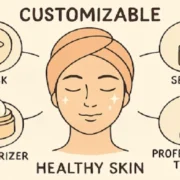What is Preventive Dental Care?
Preventive dental care refers to maintaining good oral hygiene and visiting the dentist regularly to avoid dental issues before they become serious problems. This proactive approach involves several strategies aimed at preserving teeth and gums. Routine visits to a dental office that offers personalized, friendly dental care can make all the difference in one’s oral health journey. Routine examinations, cleanings, and expert guidance help take a comprehensive approach towards dental wellness, preventing minor problems from becoming major issues.
Importance of Regular Dental Visits
Regular dental visits are paramount for maintaining oral health. Dentists can remove plaque buildup that regular brushing can’t address and spot early signs of dental issues. Dentists also perform screenings for oral cancers and other conditions that, if caught early, can be far more manageable. Consistent dental check-ups in Logan Dental Care are an investment in your health that pays off by preventing severe and costly dental problems.
Benefits of Preventive Dental Care
Preventive care offers numerous benefits, including reducing the chances of cavities, gum disease, and enamel wear. Healthline states that good dental hygiene can improve overall well-being by reducing the risk of diseases associated with poor oral health. The proactive measures taken in preventive care translate to better overall well-being and lower costs for treatments down the line. Additionally, preventive care supports mental health by reducing anxiety associated with dental issues and enhancing one’s confidence through a healthy, bright smile.
The Role of Dental Hygienists
Dental hygienists have an essential role in promoting preventive dental care. They perform teeth cleanings, conduct initial screenings, and educate patients on proper dental hygiene practices. Their efforts can significantly reduce the risk of developing more serious dental issues. Dental hygienists play a crucial role in preserving dental health by eliminating plaque and tartar that could result in gum disease. Furthermore, dental hygienists often provide personalized care tips and strategies tailored to an individual’s needs, making dental health more accessible and manageable.
At-Home Dental Care Tips
Good dental care begins at home. Here are some essential tips:
- Make sure to brush your teeth using fluoride toothpaste two times daily.
- Floss every day to eliminate plaque from places unreachable by your toothbrush. Flossing is essential to avoid gum disease and maintain the health of the spaces between your teeth.
- Limit sugary and acidic foods and drinks. These have the potential to weaken tooth enamel and cause decay.
- Use mouthwash to kill bacteria and improve oral odor. Mouthwash can reach areas where brushing and flossing may not, offering additional defense against cavities and gum disease.
Incorporating these practices into your daily schedule can significantly improve your dental health and stop various common dental problems from developing.
Catching Problems Early
One key benefit of receiving preventative dental care is detecting issues early. Detecting problems such as cavities or gum disease early on enables less invasive treatments and improved results. An untreated, minor cavity may progress to a point necessitating a root canal or extraction, whereas a timely filling can address the issue. By monitoring your dental health regularly, dental professionals can provide timely interventions, saving you from more extensive procedures and preserving your natural teeth for as long as possible. This early treatment approach not only alleviates potential discomfort but also reduces the overall cost of dental care.
Preventive Care for Special Populations
Certain groups, such as children, the elderly, and individuals with chronic illnesses or disabilities, require special attention when it comes to dental care. Tailored preventive strategies can help these populations maintain optimal oral health. Children, for example, benefit from sealants and fluoride treatments, enhancing their defense against cavities during the crucial early years of tooth development. Elderly individuals may need care that addresses dry mouth or weakened teeth, which are more prevalent with age. Those with chronic illnesses might require specialized dental care plans to handle the oral manifestations of their conditions or the side effects of their medications.
Common Myths About Dental Care
Many myths surround dental care, such as the belief that you only need to see a dentist when you have a problem. Dispelling these myths can encourage better dental habits and promote a culture of preventive care. Routine dental exams are essential for preserving oral health without discomfort or apparent problems. Another common myth is that flossing can create gaps between teeth, which deters people from this necessary practice. Educating the public about the realities of dental care can foster healthier habits and a more proactive approach to oral health, ultimately leading to fewer dental issues and better overall well-being.
Caring Touch Home Health Makes a Difference in Patients’ Lives










Comments